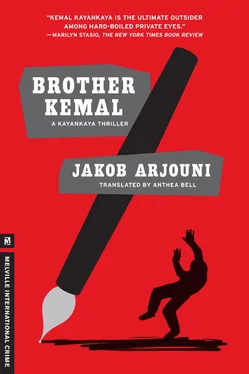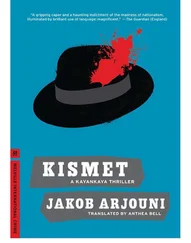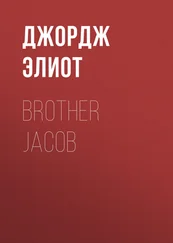Jakob Arjouni - Brother Kemal
Здесь есть возможность читать онлайн «Jakob Arjouni - Brother Kemal» весь текст электронной книги совершенно бесплатно (целиком полную версию без сокращений). В некоторых случаях можно слушать аудио, скачать через торрент в формате fb2 и присутствует краткое содержание. Жанр: Криминальный детектив, на английском языке. Описание произведения, (предисловие) а так же отзывы посетителей доступны на портале библиотеки ЛибКат.
- Название:Brother Kemal
- Автор:
- Жанр:
- Год:неизвестен
- ISBN:нет данных
- Рейтинг книги:5 / 5. Голосов: 1
-
Избранное:Добавить в избранное
- Отзывы:
-
Ваша оценка:
- 100
- 1
- 2
- 3
- 4
- 5
Brother Kemal: краткое содержание, описание и аннотация
Предлагаем к чтению аннотацию, описание, краткое содержание или предисловие (зависит от того, что написал сам автор книги «Brother Kemal»). Если вы не нашли необходимую информацию о книге — напишите в комментариях, мы постараемся отыскать её.
Brother Kemal — читать онлайн бесплатно полную книгу (весь текст) целиком
Ниже представлен текст книги, разбитый по страницам. Система сохранения места последней прочитанной страницы, позволяет с удобством читать онлайн бесплатно книгу «Brother Kemal», без необходимости каждый раз заново искать на чём Вы остановились. Поставьте закладку, и сможете в любой момент перейти на страницу, на которой закончили чтение.
Интервал:
Закладка:
‘Forgive me, but if you sell the house you can live almost anywhere in the world with the money you’d get for it.’
‘When I said my parents offered me the house, I didn’t mean they gave it to me. In fact we pay rent, although it’s a relatively low rate — that mattered to my parents, as a symbol.’
She paused, went over to a grey corduroy-covered sofa about the size of my guest room, and took a white cardigan off the back of it. As she put the cardigan round her shoulders, she said, ‘My parents and I haven’t always got on well together.’
‘Did you grow up in this house?’
‘Yes. I was seven when my parents moved to Frankfurt, and I lived here until I was sixteen. Anyway: we thought it was only for an interim period until we’d decided where we wanted to live. But then … my husband’s pictures stopped selling so well, and at the same time we got used to the comfort and size of the house, Marieke was making Frankfurt her home, and so on — many reasons, some of them good, why we’re still here. However, my husband has never changed his opinion of Frankfurt and particularly this part of it. You see, he grew up in Amsterdam, he’s lived in New York, Barcelona, Paris — in the shabby districts of those cities, I wouldn’t want you to think he’s missing a life of glamour. When he was studying medicine in Amsterdam, he lived in a student hostel, later often in unheated attics, and in Paris we had a four-roomed basement apartment in Belleville. What he misses here is life with all its surprises. The only surprise you may get in the streets of Frankfurt is when one of the ladies in fur coats walking her permed dogs greets you in a friendly tone of voice.’
Valerie de Chavannes sat back in the Art Cologne armchair opposite me, and I wondered how many fur coats she had hanging in her own wardrobe. Or did the fact that she paid her parents rent mean that no financial support at all came her way from the château on the Loire? But who paid for the housekeeper, the deluxe furniture, the sparkling clean racing bike in the hall?
‘So you tried to bring a little of the life he missed into this place in the person of Abakay?’
‘He wasn’t the first. Whenever I meet someone who I think might interest Edgar, I bring that person home. Do you understand? I do so wish that Frankfurt could be more fun for Edgar. And I thought, Well, at least Abakay isn’t just sausages and stocks and shares. So I invited him to supper, and it all went terribly wrong. Edgar thought he was a puffed-up windbag, and Marieke took Abakay’s side in a pointless discussion about the freedom of art. Only to annoy us, of course …’
Suddenly something unpleasant seemed to occur to her. Or rather, something that was unseemly in the circumstances; something to do with me. For a moment, she looked at me as if she had just that moment noticed that I looked like some bastard out of her past — a teacher with bad breath who felt her up while giving her extra tutoring, or an ex-boyfriend who’d made off with her jewellery, something along those lines.
She lowered her eyes and began massaging her hands. ‘Now you know what I meant when I said I was thinking mainly of my husband.’
‘Hmm. A discussion about the freedom of art? What was that about?’
She hesitated, looked up briefly, then back at her hands again. She massaged them calmly and regularly. She was good at putting on a show of calm regularity, sometimes of anger and contempt as well. It was only now and then that the mask slipped — and behind it, or so it seemed to me, Valerie de Chavannes was shaking with fear.
‘About those stupid caricatures.’
I guessed what she meant, but I said, ‘I’ve no idea what you’re talking about.’
‘Well, the caricatures of Muhammad. All the fuss about them back then — how long ago is it? Three or four years? You must have heard about it.’
This time she was looking straight at me, and her expression was somewhere between worry and discontent. Was she treading on the toes of a guy called Kemal Kayankaya, or was the private detective, who in the course of this conversation had finally seemed to her like a reasonably civilised person, just an uneducated idiot after all?
‘I understand. Yes, I heard about all that. What attitude did Abakay adopt?’
‘Well … it wasn’t so much about himself — Abakay is certainly not particularly devout — it was about respect for religions in general. Some relation of his — an uncle, I think — is an imam in a Frankfurt mosque.’
‘Is Marieke susceptible to that sort of stuff?’ I looked on the glass-topped table at the photographs of the stern-faced girl.
‘You mean religion?’
I nodded. ‘Maybe she’s not gone off with Abakay after all but with the Lord God Almighty?’
‘Oh no, she …’ Valerie de Chavannes shook her head, looked despairingly at the ceiling of the room, where her glance lingered briefly as if it showed her pictures of the disastrous evening. ‘It was just because of us, or maybe just because of my husband. You see, we’re modern, enlightened people, religion has never been important to us or Marieke. And that evening, well, she simply sensed she could make her father go ballistic. If the subject comes up Edgar is an outspoken atheist. He hates any form of religion. And then his daughter suddenly starts defending the veil as a cultural inheritance, an Oriental fashion accessory, a way for a woman to protect herself from men’s eyes, and I don’t know what else. Even Abakay contradicted her — he could have been privately smiling to himself, I don’t know. As I said, it was all pointless. Edgar loves Marieke more than anything, and at the moment she’s trying to shake off that love.’ Valerie de Chavannes paused, and it was obvious that she was wondering whether to tell me something in confidence. ‘You said just now that I didn’t seem to know the names of my daughter’s friends very well, and by comparison with Edgar you’re certainly right. He can probably list the first names and surnames of all Marieke’s friends from primary school on. Do you have any children?’
The question came as a surprise, and I thought of Deborah two days ago as we had our aperitif (a term introduced by Deborah; I’d have stuck with, ‘I drink a couple of beets before supper’) bringing up for the first time her desire to have children.
‘No.’
‘Love for your children can sometimes become almost monstrous. I hope you realise how important it is for Edgar to never on any account find out that Marieke has been with Abakay. He’d never forgive her.’
‘Don’t you mean he’d never forgive you?’
Valerie de Chavannes stared straight at me. Her mouth slowly closed, and that I-only-ever-think-of-one-thing expression came back. In fact it was simply a way of looking down on men who, she supposed, only ever thought of one thing when they looked at her.
After a pause, she said, ‘You’d have liked it to be a bit more usual, a bit shabbier, right? Or can’t you imagine that a woman like me — snake tattoo and so on — doesn’t jump into bed with every half-attractive man? Go ahead, as far as I’m concerned — but if you think I’d be idiotic enough to then invite the man to my house for supper, I take that as a real insult. Incidentally, in case you’re interested, my husband and I are happily married.’
‘I’m glad to hear it, Frau de Chavannes.’ I nodded to her with my head bent, the way I suppose servants anxious to keep their jobs do. ‘Particularly for your husband’s sake. And I can easily understand that you do not jump straight into bed with every half-attractive man. However, what I don’t entirely understand is that with a wife like you — snake tattoo and so on — there isn’t something in the air when a young curly-haired underground photographer turns up for supper at your invitation. At least so far as the photographer’s concerned, and I’d bet that one or another thought went through your husband’s mind.’
Читать дальшеИнтервал:
Закладка:
Похожие книги на «Brother Kemal»
Представляем Вашему вниманию похожие книги на «Brother Kemal» списком для выбора. Мы отобрали схожую по названию и смыслу литературу в надежде предоставить читателям больше вариантов отыскать новые, интересные, ещё непрочитанные произведения.
Обсуждение, отзывы о книге «Brother Kemal» и просто собственные мнения читателей. Оставьте ваши комментарии, напишите, что Вы думаете о произведении, его смысле или главных героях. Укажите что конкретно понравилось, а что нет, и почему Вы так считаете.












